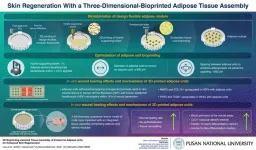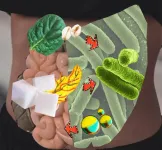(Press-News.org) COLUMBUS, Ohio – In our polarized society, a new study offers hope for the future: Even young children can learn to discuss and argue about meaningful problems in a respectful and productive way.
Researchers at The Ohio State University found success in a social studies curriculum for fourth graders based on teaching what they called “civic competencies.”
Over the course of a school year, findings showed that the students participating in the curriculum significantly improved their argumentation skills and disciplinary thinking.
“This will give them the ability to collaborate, communicate effectively and consider multiple perspectives”, said Tzu-Jung Lin, co-author of the study and professor of educational psychology at The Ohio State University.
“We aim to help cultivate a new generation of responsible community members and citizens who can work together to help solve complex issues,” Lin said.
The study was published recently in the Journal of Social Studies Research.
The research involved 106 fourth-grade students and six social studies teachers from two public school districts in the Columbus area. They participated in a social studies curriculum called Digital Civic Learning (DCL), which was developed at Ohio State.
“Students as young as elementary school start to encounter important issues in the world around them that don’t have a right or wrong answer,” Lin said.
“What we are trying to do with the DCL curriculum is to teach children the process to be a better thinker about these issues and learn how to resolve conflicts around them.”
One part of the curriculum involved what is called disciplinary thinking. This means teaching students how to read, write and think differently depending on the subject matter. In the DCL, students were taught four ways of thinking: geographic, economic, historical and civic.
“When students learn disciplinary thinking, they learn how professionals in each of these four disciplines approach a problem,” said co-author Haeun Park, a doctoral student in educational psychology at Ohio State.
“And later in the curriculum, students learn how to use all of those types of thinking in an interdisciplinary way. For example, students may learn to think about a specific problem from an economics point of view, but also from the view of an historian.”
This interdisciplinary approach can help students with their argumentation skills, which was the other focus of the curriculum. Students were taught how to develop an argument and counterargument about different positions using their disciplinary thinking skills.
In the classes, students honed their disciplinary thinking and argumentation skills through stories. The children were given a story about characters facing some sort of challenge, such as living in a food desert where healthy, affordable food options are limited.
“These stories are designed to be real-life problems that don’t have a set answer,” said study co-author Kevin Fulton, a doctoral student in educational psychology at Ohio State.
“The students can bring their own perspectives to the conversation, and they can agree on all the facts and disagree on what a good solution looks like.”
In order to measure how much the students learned from the DCL curriculum, the researchers had the students write essays at the beginning of the school year and at the end on meaningful problems that were relevant to their lives.
For example, one writing prompt had to do with a school lunch system that used AI to scan faces to see if the student owed money for their meals.
Students had to grapple with the negative ethical and privacy issues of the system as well as the positive user-friendly advantages and come to a decision about whether the AI system should be implemented.
Trained coders rated how well the students did on using disciplinary thinking and argumentation skills in their essays at the beginning of the year, and then again at the end.
The goal was to see if the students improved after taking the DCL curriculum. Results showed they did.
For example, about 27% of students scored 3 out of 4 or above on claim-evidence integration (one of the argumentation skills) in their essays at the beginning of the course. But that increased to 43% at the end of the course.
Use of disciplinary thinking also showed an increase from 27% to 48% after the DCL curriculum was completed.
The researchers said they are hopeful that a curriculum like this could help long-term in healing some of the fractures in our society.
“We believe that if we can embrace these civic competencies, we can find common ground, even with our different beliefs and different backgrounds,” Lin said.
“We can still work together as a group to solve our problems.”
The research was supported by a grant from the Institute of Education Sciences.
Other Ohio State co-authors were Adriana Martinez Calvit, Ziye Wen, Yue Sheng, Michael Glassman and Eric Anderman. Saetbyul Kim from the Korean Educational Development Institute was also a co-author.
END
Teaching kids how to become better citizens
Fourth graders learn argumentation and thinking skills
2025-03-03
ELSE PRESS RELEASES FROM THIS DATE:
Pusan National University researchers develop a novel 3D adipose tissue bioprinting method
2025-03-03
The adipose tissue, which serves as an endocrine organ, releases various molecules that regulate the repair of other damaged tissues, including the skin. Hence, adipose tissues can potentially be reengineered to regenerate the damaged organs. Three-dimensional (3D) bioprinting technology has revolutionized regenerative medicine by enabling the generation of engineered and functional 3D organs or tissues, including adipose tissues. However, the currently used tissue biofabrication methods cannot replicate ...
Scientists use AI to better understand nanoparticles
2025-03-03
A team of scientists has developed a method to illuminate the dynamic behavior of nanoparticles, which are foundational components in the creation of pharmaceuticals, electronics, and industrial and energy-conversion materials. The advance, reported in the journal Science, combines artificial intelligence with electron microscopy to render visuals of how these tiny bits of matter respond to stimuli.
“Nanoparticle-based catalytic systems have a tremendous impact on society,” explains Carlos Fernandez-Granda, director of NYU’s Center for Data Science and a professor of mathematics and data science, one of the paper’s authors. “It is estimated that 90 percent ...
We feed gut microbes sugar, they make a compound we need
2025-03-03
Gut microbes that were thought to feed exclusively on dietary fiber also get fed sugar from our guts, from which they produce short-chain fatty acids that are crucial to many body functions. The Kobe University discovery of this symbiotic relationship also points the way to developing novel therapeutics.
Gut microbes produce many substances that our body needs but cannot produce itself. Among them are short-chain fatty acids that are the primary energy source for the cells lining our guts but have other important roles, too, and ...
One of the largest psychotherapy trials in the world has implications for transforming mental health care during pregnancy and after birth
2025-03-03
Approximately one in five of pregnant and postpartum individuals experience depression and anxiety, yet less than 10 per cent receive proper treatment.
To address this problem, a team of interdisciplinary researchers from Canada and the United States investigated if talk therapy can be effectively delivered by non-mental health specialists and telemedicine to increase access. In a paper published today in Nature Medicine, they share results from the Scaling Up Maternal Mental health care by Increasing access to Treatment (SUMMIT) Trial, which reveals promising strategies to provide the necessary support and treatment more effectively and inclusively ...
It’s not just what you say – it’s also how you say it
2025-03-03
EVANSTON, Ill. --- You’ve probably heard the phrase, “It’s not what you say, it’s how you say it,” and now, science backs it up. A first-of-its-kind study from Northwestern University’s School of Communication, the University of Pittsburgh and the University of Wisconsin-Madison reveals a region of the brain, long known for early auditory processing, plays a far greater role in interpreting speech than previously understood.
The multidisciplinary study being published Monday, March ...
Sleep patterns may reveal comatose patients with hidden consciousness
2025-03-03
NEW YORK, NY (March 3, 2025)--Several studies in the past decade have revealed that up to a quarter of unresponsive patients with recent brain injuries may possess a degree of consciousness that’s normally hidden from their families and physicians.
New research from Columbia University and NewYork-Presbyterian may soon help physicians identify unresponsive brain-injury patients with hidden consciousness who are likely to achieve long-term recovery by looking for brain waves that are indicative of normal sleep patterns.
“We’re at an exciting crossroad in neurocritical care where we know that many patients appear to be unconscious, but some are recovering without ...
3D genome structure guides sperm development
2025-03-03
Two new landmark studies show how a seeming tangle of DNA is actually organized into a structure that coordinates thousands of genes to form a sperm cell. The work, published March 3 as two papers in Nature Structural and Molecular Biology, could improve treatment for fertility problems and developmental disorders.
“We are finding the 3D structure of the genome,” said Satoshi Namekawa, professor of microbiology and molecular genetics at the University of California, Davis and senior author on one of the papers. “This is really showing us how the genomic architecture guides development.”
Although DNA is a long, stringy molecule, in living ...
Certain genetic alterations may contribute to the primary resistance of colorectal and pancreatic cancers to KRAS G12C inhibitors
2025-03-03
Bottom Line: Colorectal cancer and pancreatic ductal adenocarcinoma that harbored the KRAS G12C mutation often carried other genetic alterations that can be associated with resistance to KRAS G12C inhibitors, despite no prior treatment with this therapy, according to recent results from a large multidatabase analysis.
Journal in Which the Study was Published: Clinical Cancer Research, a journal of the American Association for Cancer Research (AACR)
Author: Hao Xie, MD, PhD, a medical oncologist at Mayo Clinic Comprehensive Cancer Center
Background: “The KRAS pathway plays a crucial role in cell biology by regulating ...
Melting Antarctic ice sheets will slow Earth’s strongest ocean current
2025-03-03
Melting ice sheets are slowing the Antarctic Circumpolar Current (ACC), the world’s strongest ocean current, researchers have found.
This melting has implications for global climate indicators, including sea level rise, ocean warming and viability of marine ecosystems.
The researchers, from the University of Melbourne and NORCE Norway Research Centre, have shown the current slowing by around 20 per cent by 2050 in a high carbon emissions scenario.
This influx of fresh water into the Southern Ocean is expected to change ...
Hallucinogen use linked to 2.6-fold increase in risk of death for people needing emergency care
2025-03-03
People seeking emergency care for hallucinogen use were at 2.6-fold higher risk of death within 5 years than the general population, according to a new study published in CMAJ (Canadian Medical Association Journal) https://www.cmaj.ca/lookup/doi/10.1503/cmaj.241191.
The use of hallucinogens, such as ketamine, psychedelics, psilocybin, LSD, ayahuasca, and MDMA (Ecstasy), has rapidly increased since the mid-2010s, especially in Canada and the United States. In the US, the percentage of people reporting they used hallucinogens more than doubled from 3.8% in 2016 to 8.9% in 2021. “In Canada, an estimated 5.9% of people used a psychedelic ...
LAST 30 PRESS RELEASES:
$3 million NIH grant funds national study of Medicare Advantage’s benefit expansion into social supports
Amplified Sciences achieves CAP accreditation for cutting-edge diagnostic lab
Fred Hutch announces 12 recipients of the annual Harold M. Weintraub Graduate Student Award
Native forest litter helps rebuild soil life in post-mining landscapes
Mountain soils in arid regions may emit more greenhouse gas as climate shifts, new study finds
Pairing biochar with other soil amendments could unlock stronger gains in soil health
Why do we get a skip in our step when we’re happy? Thank dopamine
UC Irvine scientists uncover cellular mechanism behind muscle repair
Platform to map living brain noninvasively takes next big step
Stress-testing the Cascadia Subduction Zone reveals variability that could impact how earthquakes spread
We may be underestimating the true carbon cost of northern wildfires
Blood test predicts which bladder cancer patients may safely skip surgery
Kennesaw State's Vijay Anand honored as National Academy of Inventors Senior Member
Recovery from whaling reveals the role of age in Humpback reproduction
Can the canny tick help prevent disease like MS and cancer?
Newcomer children show lower rates of emergency department use for non‑urgent conditions, study finds
Cognitive and neuropsychiatric function in former American football players
From trash to climate tech: rubber gloves find new life as carbon capturers materials
A step towards needed treatments for hantaviruses in new molecular map
Boys are more motivated, while girls are more compassionate?
Study identifies opposing roles for IL6 and IL6R in long-term mortality
AI accurately spots medical disorder from privacy-conscious hand images
Transient Pauli blocking for broadband ultrafast optical switching
Political polarization can spur CO2 emissions, stymie climate action
Researchers develop new strategy for improving inverted perovskite solar cells
Yes! The role of YAP and CTGF as potential therapeutic targets for preventing severe liver disease
Pancreatic cancer may begin hiding from the immune system earlier than we thought
Robotic wing inspired by nature delivers leap in underwater stability
A clinical reveals that aniridia causes a progressive loss of corneal sensitivity
Fossil amber reveals the secret lives of Cretaceous ants
[Press-News.org] Teaching kids how to become better citizensFourth graders learn argumentation and thinking skills


